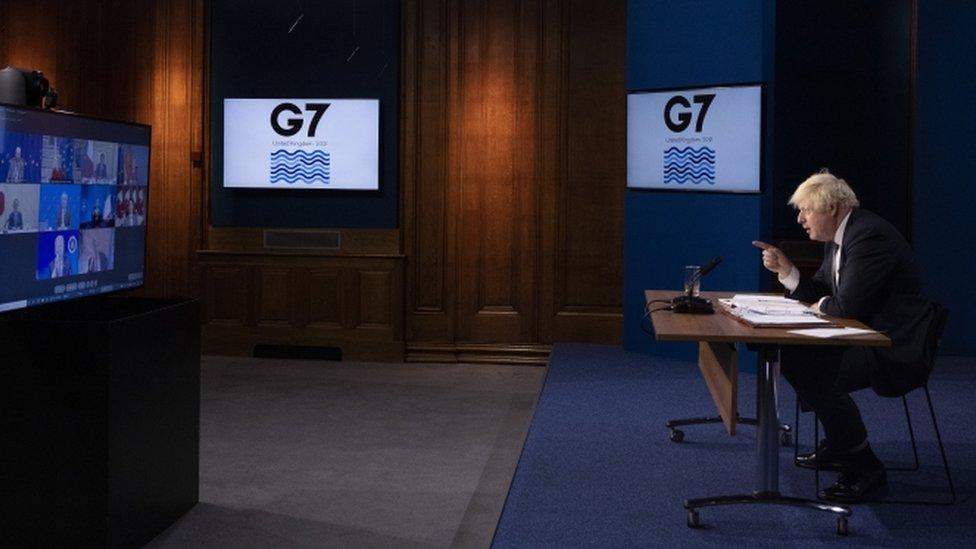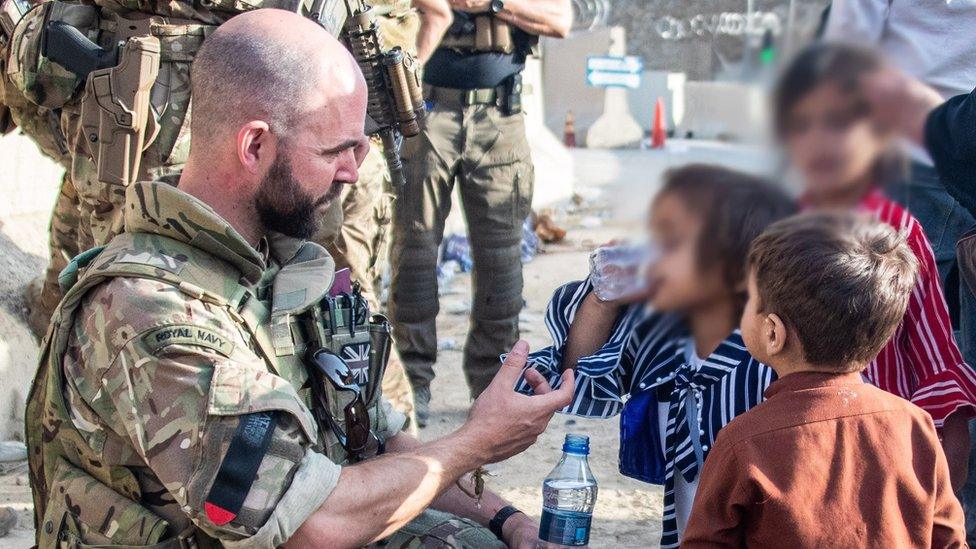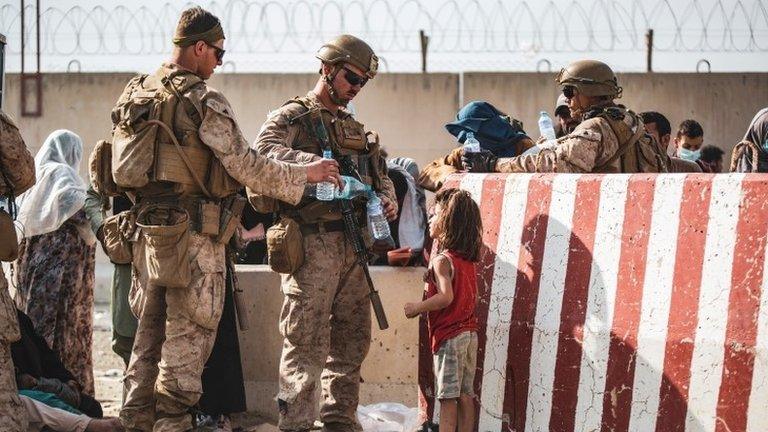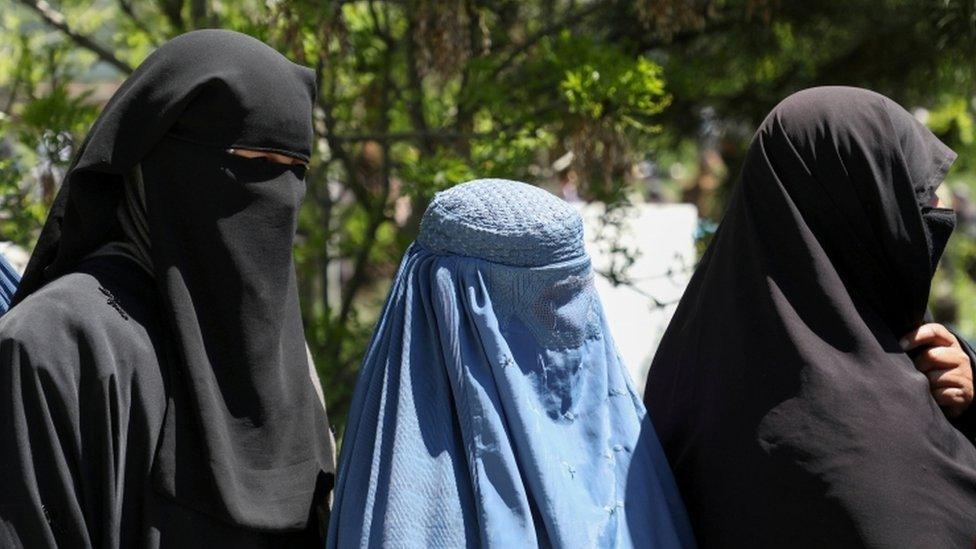Afghanistan: Taliban must allow evacuees after 31 August - Boris Johnson
- Published
Boris Johnson: The G7 powers have agreed a roadmap for engaging with a Taliban government
The Taliban must guarantee a safe passage for those who want to leave Afghanistan beyond the 31 August deadline, PM Boris Johnson has said.
Following an emergency virtual meeting of G7 leaders, Mr Johnson said the UK would continue evacuating people from the country "until the last moment".
He added he was confident thousands more could be airlifted out.
US President Joe Biden told the G7 meeting the US was "currently on pace" to finish its mission by 31 August.
Defending the decision to leave, he warned of the risk of a terrorist attack on US troops in the region, adding: "The sooner we finish the better".
The UK was among several other G7 countries pressing the US to delay its withdrawal of troops, warning they will not be able to evacuate all those fleeing the Taliban after 31 August without the US presence at Kabul airport.
Mr Johnson, who chaired the meeting, said the G7 - the UK, US, Canada, France, Germany, Italy and Japan - had agreed a "roadmap" for engaging with the Taliban, which retook full control of the country nine days ago.
"The number one condition that we are insisting upon is safe passage beyond the 31st, beyond this initial phase, for those who want to leave Afghanistan," he said.
He added that the G7 had "very considerable leverage - economic, diplomatic and political" at its disposal, including withholding substantial funds from the Taliban.

Boris Johnson chaired a virtual meeting of the G7 leaders on Tuesday
The prime minister said the UK had so far evacuated 9,000 people from Kabul, across 57 flights - although he added that there were "harrowing scenes" at the airport.
"We're confident we can get thousands more out, but the situation at the airport is not getting any better," he said.

Analysis
By Paul Adams, BBC diplomatic correspondent
The numbers are pretty staggering. The Pentagon says the allies have evacuated 58,700 people in the past 10 days and more than 21,000 in the past 24 hours alone. Planes are leaving Kabul airport at a rate of one every 45 minutes.
But when it's over, the international community has a huge job to do. To help Afghanistan without necessarily helping the Taliban. To persuade Afghanistan's new rulers to let people leave, but in ways that won't throw them into the arms of people smugglers.
To prevent terrorist groups gaining a foothold. And to use what levers Western powers have - aid, access to international finance and, if necessary sanctions - to preserve what are rightly seen as the gains of the past 20 years, particularly as they relate to women and ethnic minorities.
This twilight phase, between a Western-backed government and a Taliban that says it has changed, has already thrown up extraordinary moments. Not least, the widely reported meeting, yesterday, between CIA Director William Burns and the Taliban leader Abdul Ghani Barader.
Whether that meeting ranged beyond the question of when the evacuation ends is not known. But other high level meetings will have to follow if fragments of success are to be plucked from what, right now, still looks like a catastrophic failure of Western policy.

More than 1,000 UK troops are on the ground in Kabul helping to secure the airport and process British nationals and eligible Afghans.
There have been chaotic scenes at Kabul airport in recent days - people desperate to flee the country following the Taliban's swift takeover of Afghanistan have crammed in or near the airport access points.
The airport is currently being defended and run by the US, which has 5,800 troops on the ground.
Earlier, Taliban spokesman Zabihullah Mujahid said there was enough time to get foreign nationals out before the 31 August deadline.
The Taliban has previously warned of consequences if foreign forces remain after the deadline agreed with the US.
In a joint statement after the meeting,, external the G7 leaders said that the legitimacy of any future government in Afghanistan depended on its approach to upholding international obligations.
They said the Taliban must safeguard the human rights of all Afghans, "particularly women, children, and ethnic and religious minorities".
It comes after the UN highlighted "credible" reports of abuses by the Taliban, notably restrictions on women.
Lisa Nandy: Lack of G7 plan on Afghanistan "is a really, really shameful moment for the UK"
Shadow foreign secretary Lisa Nandy told the BBC that the prime minister appeared to have left the G7 meeting he was chairing "without any clear plan" for exerting pressure on the Taliban.
SNP Westminster Leader Ian Blackford said the failure to extend the deadline was "deeply regrettable" and called for Parliament to be brought back from its summer break to monitor the situation.
Liberal Democrat leader Sir Ed Davey said a failure to secure an extension showed Mr Johnson had "failed on the global stage once more, and the consequences could not be more devastating".
Related topics
- Published24 August 2021

- Published24 August 2021

- Published24 August 2021
